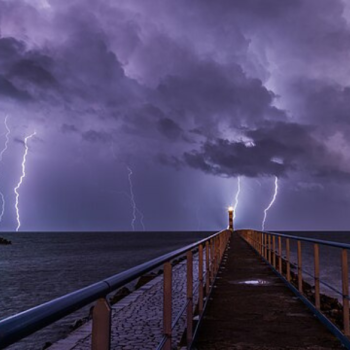This is more than nonsense. It is delusional. The truth is, we Muslims, we human beings, are now profoundly steeped in our disconnections, nearly totally dislocated from the sacred, disoriented about our mission in the world, disengaged from the orphan and widow of war, detached from the wretched poor, and derelict in our divinely appointed vicegerency over soil, sea, and air, and the life and forms they support. The Qur'anic verses and Prophetic statements detailing man's responsibilities -- not as cheap splintered activism but as rich integrating belief -- as God's earthly deputy are too numerous to utter here. But it is even now being evermore widely perceived by those who have the courage of their knowledge.
God made Islam for the precise mission of empowering man to rekindle his sacred inner light and then resacralize the earth. That is the paradigm Islam still offers us in this time of environmental crisis. This comes into clear relief when we consider the basic principles prevailing in the West today that have unraveled the ecology, and since the West is where most of the consumption and pollution in the world is taking place and where most of the initiative to counter its disastrous impact has begun.
A defining premise underlying most environmental conversations today is the idea of "scarcity," the notion that the earth and its resources are insufficient for man, that it cannot support 6 billion people in an advanced stage of civilization. This is in sharp contrast to a raft of studies (as well as Islamic history), both of which show that small scale but diverse agriculture is not only highly productive and sustainable, but, in fact, superabundant and virtually perpetual.
Obviously, a paradigm of scarcity engenders vastly different attitudes among people, and consequences, than one of abundance, upon which Islam rests; namely, that God is all-generous Giver of plenty. "To each -- those [who are hasty for the world] and those [who strive for God] -- We extend something of your Lord's bounty. Yet never is the bountiful gift of your Lord confined" [17:20]. In fact, the violence that has characterized Western history stems largely from a fear of economic scarcity relentlessly propagated in the culture. This is well represented today in the barbaric idea of the need for enforced population control of the "other," which is gaining currency.
The perception of "limited" resources is actually false since all resources are renewable, but on varying time scales. Some may take ages to build up, but they are nonetheless renewable. Earth's problems are not with its resources but with the way commercial interests abuse them, which betrays a thoroughly corrupted two-fold premise.
The first assumption is that the only socio-economic value is increase of wealth, measured as profit and loss, or GDP (gross domestic product). This is the impulse that enslaved science to the profit motive, giving us technology that is completely wasteful because in the capitalist paradigm waste (planned obsolescence, for example) increases production and consumption.
Assumption two of our corrupt commercial paradigm is the belief that life is a zero-sum phenomenon. Thus for one person to win, another must lose. This is premise is factual only in a socio-economic system in which there is an elite exploiting all others. True sustainability amounts to a negative profit for mega-industries whose philosophy is perpetual growth for the purpose of consolidating power in structures that subsume the governance apparatus of people and all their institutions. And just as history witnessed the principle-based and sustainable agriculture of the Muslims competitively undo vast land monopolies and liberate millions of serfs, transforming their fiefdoms into small-scale farms owned by their laborers, so today sustainability can undo the system of perpetual growth and channel its resources into the justice of liberated and sovereign people and communities.
True sustainability and justice, a win-win cooperation, is a realistic model as centuries of Islamic civilization have demonstrated. And for those who don't know, this was a highly scientific, technologically advanced, ecologically and economically sustainable, and global civilization. For those not familiar with the 900-plus years of Islamic civilization that was inherited by the West, there is currently an abundance of "fringe" science (not supported by academics or industry) demonstrating that we can be sustainable and just without returning to the Stone Age.
The Qur'an itself brings forth many lessons of past environmental disasters, from local to global scale crises. What it communicates to us is that anytime there was an environmental disaster, it was, in fact, brought about by people's own hands, inspired by their false beliefs -- regardless of how wealthy, powerful, or technologically remarkable the society was.
Thus Noah's message represents the lesson for us as a global civilization on the brink of disaster, and the solution: Break the humiliating and oppressive shackles of servitude to men who cannot even create a flea, and return to the humble but dignified servitude to the One who Created us. If we do, the earth shall flourish and us in it. If we continue our abuse, the earth, loosed at Allah's command, shall destroy us.




